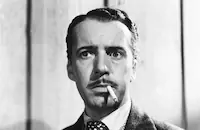Cardinal Richelieu
Cast & Crew
Rowland V. Lee
George Arliss
Maureen O'sullivan
Edward Arnold
Cesar Romero
Douglass Dumbrille
Film Details
Technical Specs

Synopsis
In 1630, a group representing the feudal lords of France ask the pope for help in their fight against King Louis XIII's minister, the Cardinal Armand Jean du Plessis, Duc de Richelieu, who has prepared an edict to strip them of their lands. The lords claim that Richelieu is mad with lust for power and fear that the edict will lead to civil war. Before the pope decides what to do, the king signs the edict. Count Baradas, the leader of the group, convinces the queen mother to visit the king at his palace in the Louvre to demand Richelieu's dismissal. After the queen mother and Baradas convince the king that Richelieu took 10,000,000 francs as a bribe from the Duke of Normandy and used the money for his own palace, Richelieu enters through a secret doorway and explains that he took the bribe to build up the king's army so that they could then take over the duke's domain. Richelieu vows that his one ambition is to make France a great power, rather than a conglomeration of petty kingdoms. When asked about his palace, Richelieu says that he plans to give it to the king when the work on it is finished, and he convinces the king of his loyalty. Back at his palace, Richelieu learns that his ward Lenore, who has recently left a nearby convent, has fallen in love with Andre de Pons, whom she has met only once. Realizing that he has just signed a death warrant against Andre, a Huguenot, for conspiring to incite the lords to resist the edict, Richelieu agrees to see him. The king, inspecting Richelieu's palace, meets Lenore, and his interest aroused, demands that Richelieu bring her to court so that she can be married. Richelieu realizes that the marriage will be only an excuse for Lenore to be at the palace so that the lustful Louis can seduce her, and he refuses vehemently. When Andre is arrested, Richelieu convinces him that France must be unified to defeat England, Austria and Spain, who are arming against her, and Andre, unaware that Richelieu is Lenore's guardian, agrees to serve him. Richelieu then demands that Andre get married, and Andre protests that he cannot because he already is in love. Even when Richelieu threatens him with death, Andre refuses to comply. Just then, Lenore enters, and Andre, upon learning her relationship to Richelieu, realizes that Richelieu was testing him. After they marry, the king laments that he would have Richelieu's head if he could rule without him. The group of lords next meet with representatives of England, Austria and Spain and pledge their support against Louis. In compliance with the demand of the representatives that the king's army not be allowed to leave Paris, the lords provoke the people of Paris to insist that the army remain to protect them. As the commander, Le Moyne, will not take the troops to meet the Spanish forces because of an order forbidding him to do so, Richelieu, himself, leads the troops out of Paris, so that Le Moyne can take charge from there. Baradas then convinces Andre, whom the king has had arrested, that Richelieu arranged his marriage as a peace offering to the king and planned Andre's arrest so that the king could have Lenore. Baradas reveals that the queen mother is taking a secret treaty to the Spanish forces, and Andre agrees to assassinate Richelieu. However, he finds Lenore with Richelieu, rather than at the palace, and realizes he has been tricked. After Andre makes Baradas believe that he strangled Richelieu, Richelieu locates the queen mother and seizes the treaty. He takes it to Louis as proof of the conspirators' treachery, but before he can present it at court, the king's troops move to seize him. He then raises a cross and proclaims, as a priest, a circle of sanctuary through which he may approach the king. After he presents the king with the treaty, Richelieu declares that France is now united into a great kingdom with all its power in one absolute ruler, Louis, and that he, Richelieu, is Louis' shadow.

Director
Rowland V. Lee
Cast

George Arliss

Maureen O'sullivan

Edward Arnold

Cesar Romero

Douglass Dumbrille

Francis Lister

Halliwell Hobbes
Violet Kemble Cooper

Katharine Alexander
Robert Harrigan
Joseph Tozer
Lumsden Hare

Russell Hicks
Keith Kenneth
Murray Kinnell

Herbert Bunston
Guy Bellis

Boyd Irwin

Leonard Mudie
David Clyde
Charles Evans
Reginald Sheffield
Frank Dunn
William Worthington
Pat Somerset
Leo Mccabe

Gilbert Emery

Holmes Herbert
Lionel Belmore
Wilson Benge

John Carradine
Tom Ricketts

Arthur Treacher
David Thursby
Reginald Barlow
D. W. Mcreynolds
Jack Harvey
Perry Ivins
Raymond Lawrence
John (jack) Rutherford
Eric Wilton
Jack Carlyle
Crew
Hilda Anderson
George Atkinson
Ray Binger
Bill Bridgehouse
Fred Cavens
Bill Cooley
Red Crawford
Harry Davis
Richard Day
Ed Ebele
Bill Forsyth
Lee Frederic
William Goetz
Ken Green
Raymond Griffith
Roger Heman
Julia Heron
Martin Hershey
Maude Howell
Jimmy Jackson
Lou Johnson
Nunnally Johnson
Omar Kiam
Buddy King
Edward P. Lambert
Arthur Levy
W. P. Lipscomb
Peverell Marley
V. L. Mcfadden
Don Mckay
Allen Mcneil
Norbert Myles
Harry Neuman
Alfred Newman
Guy Pearce
Cameron Rogers
Ernest Rotchy
Joseph M. Schenck
Lew Schreiber
Isabelle Sheridan
Ben Silvey
John Smith
Sherman Todd
United Costumers, Inc.
Vinton Vernon
Darryl F. Zanuck

Film Details
Technical Specs

Quotes
Trivia
Notes
According to information in the Twentieth Century-Fox Records of the Legal Department at the UCLA Theater Arts Library, Maureen O'Sullivan was loaned from M-G-M and Douglass Dumbrille from Columbia. The Twentieth Century-Fox Produced Scripts Collection, also at UCLA, contains an undated document by Zanuck entitled "Cardinal Richelieu Suggestions," written before Maude Howell was brought onto the project, in which he advises that the Bulwer-Lytton play, along with a play by Arthur Goodrich and a book by Gladys Price be used as source material. He notes that if the Goodrich play will not be sold, "we can write our own original based on Bulwar-Lytton [sic] version and the Gladys Price book, carefully avoiding Goodrich version and purchasing Price version for protection." The screen credits list only the Bulwer-Lytton play as the source for the film, and it is not known if material from the other sources were used. Variety noted that "those concerned with the script ... have discarded the stilted form of Lord Lytton and have modernized it without making it colloquial." In his notes, Zanuck mentions that the question of whether or not Richelieu was "really a great Catholic" had not been decided. He noted that "the Church generally speaking is not so much for him as there is no doubt but that many of his deals are questionable." Zanuck wanted "to keep alive ... the controversy. We must, of course, pacify the Church; but, at the same time ... some parts of our picture should be open to criticism from Catholics, etc., but keeping always in mind that we must do nothing to offend the Church." Zanuck also suggested an ending which was not used: a deathbed scene in which Richelieu and the king are reconciled, and then a funeral, supposedly based on fact, in which the important people of the world, including those who hated him, marched behind his casket "realizing that regardless of what he did he lifted France from nothing to a world power."
This was George Arliss' last film made in Hollywood. According to information in the Produced Scripts Collection, a Technicolor sequence in the interior of the Notre Dame cathedral was planned. No information has been located to determine if this sequence was ever filmed. According to correspondence in the MPAA/PCA Collection at the AMPAS Library, after the film's opening, the Swedish government objected to the portrayal of their most famous king, Gustavus Adolphus. While they stated that he never was in Paris, they did not object to this historical inaccuracy, but to the picture of the king selling himself and his mercenaries and his statement that he works better when he is drunk. They stated that the king was not a drinking man. Because of the protest, the studio had corrections made in all prints to eliminate the reference of the king selling himself to Richelieu and lines that the king drank or was drunk.
Other films based on the life of Richelieu include the 1910 Vitagraph film, Richelieu, or the Conspiracy, directed by J. Stuart Blackton and starring Maurice Costello; a 1911 Edison film, entitled The Cardinal's Edict; and two films produced in 1914, Cardinal Richelieu's Ward, made by Thanhouser and starring James Cruze, and Richelieu, made by Universal, directed by Allan Dwan, and starring Murdock MacQuarrie (see AFI Catalog of Feature Films, 1911-20; F1.0608 and F1.3712).












